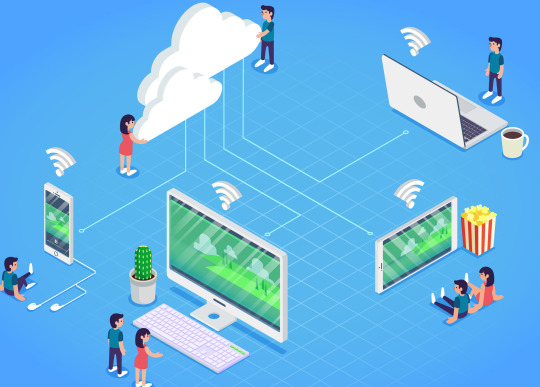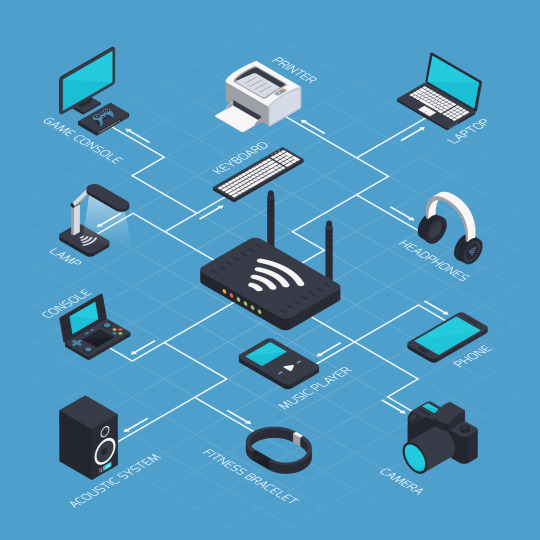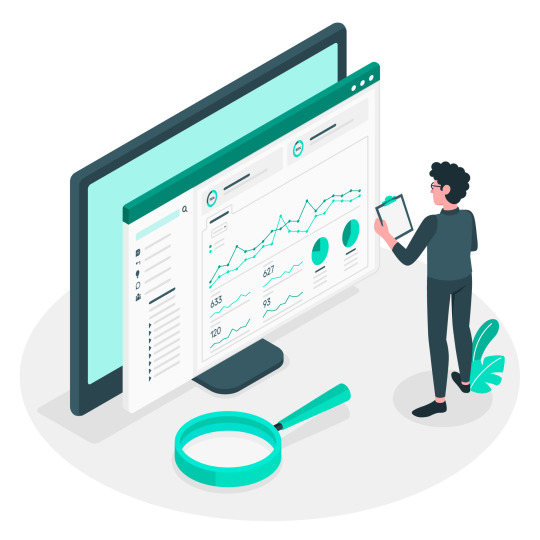Don't wanna be here? Send us removal request.
Text
Computer Networks: Basics, Types, and Benefits Explained
Computer networks are a big part of today’s highly automated world. They connect people, systems, and devices, making communication and resource sharing effortless. Whether it’s examining the internet, collaborating on projects, or sharing files, computer networks play a vital role in both personal and professional environments. We’ll cover the basics of computer networks, discuss their different types, and see the benefits they deliver.

What is a Computer Network?
A computer network is basically a system where multiple devices are linked together to share resources and exchange data. These devices can include laptops, mobile phones, servers, and networking equipment like routers. Networks enable smooth communication and allow devices to work together efficiently, making everything from browsing the web to managing complex business operations much easier.
Types of Computer Networks
Personal Area Network (PAN):
Personal Area Networks are designed as small networks intended for individual purposes. They usually span a limited distance and link devices such as.
smartphones, laptops, and tablets. For instance, connecting your phone to your computer via Bluetooth forms a simple PAN.
Local Area Network (LAN):
LANs are commonly used in homes, schools, and offices to connect devices within a limited area. For example, to allow employees to share files and printers seamlessly, all the computers in an office might be connected to a LAN.
Wide Area Network (WAN):
A WAN stretches over a significantly larger territory, often connecting devices or LANs across cities, countries, or even continents. The internet is the most well-known example of a WAN, authorized global connectivity.
Metropolitan Area Network (MAN):
Sitting between LANs and WANs, a MAN is typically used to connect networks across a campus or city. Cable TV networks are a common example of a MAN.
Wireless Networks:
Wireless networks use technologies like Bluetooth or Wi-Fi to connect devices without cables. They’re widely used in offices, homes, and public places, offering convenience and mobility.
Key Components of Computer Networks
Devices (Nodes): Servers that interact within the network these include computers and smartphones.
Connections (Links): The physical or wireless pathways that transfer data between devices.
Protocols: These are the rules that control data transmission, such as TCP/IP, to maintain smooth communication.
Switches and Routers: Switches connect devices in a network, while routers link different networks together.

Benefits of Computer Networks
Resource Sharing:
Networks make things easy to share like files, printers, and software applications, reducing the need for duplicate resources.
Seamless Communication:
With instant messaging, email, and video calls, networks ensure quick and authentic communication, no matter how far away are you.
Cost Savings:
By collecting resources and data storage, networks cut down on operational costs, especially for businesses.
Anywhere Access:
Modern networks allow you to access data from any connected device, whether you are at home or on the go.
Scalability:
As your needs develop networks will grow too, by supporting more users and devices over time.
Increased Productivity:
It reduces delays in automated processes and real-time data sharing and streamlines workflows, boosting efficiency.
Why Computer Network Skills Are Crucial for Entry-Level Corporate Roles
For those starting their careers, knowledge of computer networks can be a significant asset:
Essential for Office Environments:
In today's world, most workplaces rely on LANs and WANs for everyday operations. Knowing how these networks function allows employees to balance basic connectivity issues, making sure work stays on track without interruptions.
Supports Collaboration Tools:
Corporate tools like Microsoft Teams, Slack, and cloud-based systems depend heavily on networks. Understanding their underlying principles helps entry-level employees adapt quickly to these platforms.
Enhances Problem-Solving Skills:
Entry-level employees with networking knowledge can help IT, teams, by identifying and resolving minor network problems, exhibiting their value early on.
Boosts Technical Proficiency:
Networking skills indicate a candidate’s technical potential, giving them a head start in industries where tech literacy is required.
Prepares for Future Roles:
As technology makes progress, advanced networking concepts like cybersecurity and IoT integration are becoming integral. Early experience with networks lays a strong beginning for growth in these areas.
Challenges of Computer Networks
Security Risks: Networks are at risk of threats like hacking and malware, requiring robust security measures.
Cost of Setup: High-quality network infrastructure can be costly to install and maintain.
Technical Complexity: Balancing and managing networks frequently need specialized skills.
Conclusion
Computer networks are essential in today’s globalized world. From pushing day-to-day operations in businesses to enabling global communication, their impact is wide-ranging. For aspiring professionals, having computer networking skills can provide a competitive advantage, especially in entry-level corporate roles where technical knowledge is highly valued. By understanding the basics of networks and their benefits, individuals, and organizations can unlock new levels of productiveness and innovation.
I mastered Computer Network at NIPSTec, which is renowned as the best Computer Network institute in Delhi. If you're in Delhi and looking for top-notch training in computer networks, visit NIPSTec for expert guidance and practical learning.
2 notes
·
View notes
Text
Master Computer Typing: Tips for Speed & Accuracy
INTRODUCTION
Computer typing is a skill that allows you to input information, right? You can do so many things once you learn typing like creating documents and communicating with a computer keyboard. It's an essential skill in today’s digital world, helping you work faster and more expertly. Even if you are a student, professional, or just using a computer for personal tasks, learning to type is very useful and fun.

Why is Typing Important?
Saves your time, how? Because typing quickly and accurately helps you complete tasks faster. It improves productivity as well whether you're writing emails, chatting online, or creating reports, good typing skills make your work smoother. It also enhances communication because typing is the primary way people communicate digitally through social media, emails, and messages. And nowadays everything is available online. People prefer doing things online and everything is only possible if you know how to type, small to small work needs typing even if you wanna search for something online that could only be possible if you know how to type.
Basics of Computer Typing
The Keyboard: The keyboard has different keys for letters, numbers, symbols, and functions. The first step in typing is learning the layout.
Finger Placement: let’s learn it step-by-step:
Place your fingers on the "home row" keys
Left hand: A, S, D, F
Right hand: J, K, L;
Your thumbs should rest on the space bar.
Practice Makes Perfect: Typing requires practice. Start slow, and focus on words because you should focus on accuracy before speed. Over time with patience and practice you'll type faster without looking at the keyboard.
Tips for Learning Typing
Use Online Tools: There are many websites that teach typing. Try websites like Typing.com or Keybr etc. There are many apps too, choose any website or app you like and start typing.
Take Your Time: You don’t need to rush. Speed will increase with practice so be patient and you’ll be a master at typing very soon.
Maintain Good Posture: Make yourself comfortable. Sit upright with your feet flat on the ground and your screen at eye level. Because good posture helps increase your speed.
Practice Regularly: Set aside 10–15 minutes daily for typing practice. Daily practice is the only way you can learn fast.

Benefits of Typing Skills
Career Growth: In this digital era, Many jobs require good typing skills, especially in fields like digital marketing, IT, administration, etc. Even if you work from home.
Better Focus: Once you master typing, you can concentrate on your work instead of searching for keys. Because your muscle memory will be familiar to your keyboard.
More Opportunities: Typing opens doors to online work, content creation, and other digital tasks.
Take Breaks and Avoid Fatigue
Overworking your fingers can lead to fatigue and mistakes. Avoid this thing and take breaks.
Follow the 20-20-20 rule: Look at an object 20 feet away for 20 seconds every 20 minutes.
Stretch your fingers, wrists, and arms regularly. Otherwise, you'll have back pain and your hands won't work properly because of the pain.
Stay hydrated and maintain good lighting in your workspace. It will help you focus on your work more.
Conclusion
Typing is an important skill that anyone can learn. It doesn't matter if you work or not, it will always be a plus point for you to learn it. With consistent practice, you’ll improve over time. Start small, be patient, and enjoy the process of mastering computer typing (don’t rush, you've got this!).
I mastered computer typing at NIPSTec, renowned as the best Computer Typing institute in Delhi. If you're in Delhi and looking for top-notch training in advanced Excel, visit NIPSTec for expert guidance and practical learning.
0 notes
Text
Top Skills You Need to Become a Data Scientist in 2025
Data plays a vital role in all industries. Every business owner needs data to stand in this competitive market. Well, let’s learn about data science in depth! Data scientists and their individual careers will be at the highest level of innovation by the year 2025, virtually building wiser businesses, setting profitable technologies, and assisting in creative research to change lives. There’s no need to worry if you are in school or in college, this guide will take you step by step through the most analytic skills that you will need to succeed in this career.

Why Data Science is the Career of the Future
Think of this: modern businesses and organizations are sitting on mountains of data. Every online purchase, social media post, or Netflix recommendation generates data. The heroes who can extract meaningful insights from this data? That's right—data scientists!
As 2025 companies are brushing aside advanced artificial intelligence and predictive modeling, this development will lead to a further increase of quite a significant number in the figures of qualified data scientists. Sectors like finance, health care, education, and entertainment… all are hunting for capable data professionals. Could that be YOU?
But, to become a future-ready data scientist, you'll need a solid foundation. Here's what to focus on.
The Essentials of Data Science
Programming and Scripting Languages
How do you talk to a computer? Easy—with code! Every data scientist needs command over these three languages:
Python: The superstar of programming. Python is flexible, beginner-friendly, and packed with libraries like Pandas (handling data), NumPy (crunching numbers), and Scikit-learn (building machine learning models).
R: Want next-level statistical analysis and eye-catching visualizations? This one's your go-to.
SQL: Data isn't always tucked neatly into spreadsheets—it's living in databases. SQL helps you query, update, and manage that data effortlessly.
How does YouTube know exactly what you want to watch next? Have you ever wondered? That's Python and machine learning in action!

Data Manipulation and Analysis
Every dataset has quirks—missing values, duplicate rows, or even errors. Data scientists clean and prepare this data before drawing insights. This skill is crucial for success.
Tools to master:
Probability & Hypothesis Testing: Assess your data for trends and patterns.
Regression Analysis: Find out how variables interact and predict future outcomes.
Linear Algebra & Calculus: If machine learning excites you, these topics are a must!
🤯 Fun Fact: Did you know machine learning algorithms that teach self-driving cars are steeped in calculus?
with charts turns information into action.
Key tools to explore:
Types of Machine Learning Algorithms:
Top Tools to Master
Hadoop and Spark (for handling big data).
Cloud platforms like AWS, Azure, and Google Cloud (data must be stored somewhere!).
Big data fuels everything from tailored advertising to healthcare advancements.
Soft Skills for Data Scientists
Fact time—data science isn’t only about crunching numbers! Soft skills make all the difference in your success:
Problem-solving & Critical Thinking: Approach challenges with creative, efficient solutions.
Communication: Translate technical details into layman's terms.
Collaboration: Work with diverse teams to tackle projects together.
🤔 Pro tip: Ever explained a machine-learning model to someone who doesn’t know what an algorithm is? Communication wins here!

Practical Skills Using Tools
Textbooks are great, but nothing compares to actual practice. These tools will prep you for real-world challenges:
Raw data doesn’t speak for itself, but visualizations do! Telling stories you for real-world challenges:
MySQL & MS SQL Server: Manage databases efficiently.
Power BI: Design and present actionable reports.
Project Use Cases: Learn data modeling and create polished dashboards through NIPSTec’s curriculum.
Staying Ahead of the Curve
The world of data science evolves daily. To stay current, explore these online resources:
Kaggle Competitions: Solve real-world data problems.
GitHub projects: Collaborate with experts worldwide.
Blogs & Podcasts: Stay updated on tools, trends, and codes.
Start Your Data Science Journey Today
Excited yet? Data science is the ultimate career path filled with endless challenges, opportunities, and creative solutions. It’s where passion meets precision!
And here’s some good news—NIPSTec is here to help. Our Diploma in Data Science and Artificial Intelligence will prepare you with practical knowledge, specialized know-how, and actual work to apply those skills.
🎓 The world of tomorrow will not come into being by itself, yet with the application of your expertise in data science, it might be a bit more optimistic.👉 Enroll today and start shaping the future with data. Contact us now!
1 note
·
View note